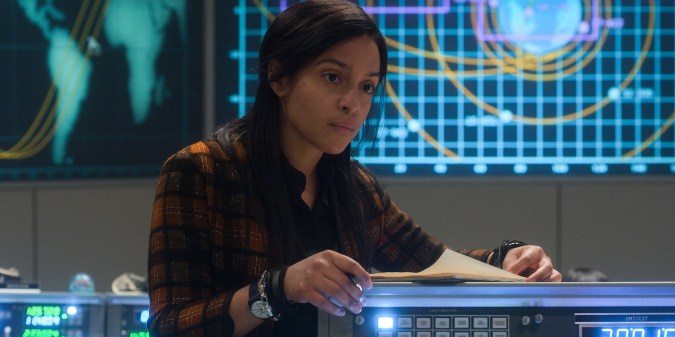In the last six years, Dominican American actress Coral Peña has worked in Hollywood, and taken on projects like her role in Steven Spielberg’s 2017 film The Post. She feels lucky that she’s yet to get a script where a character she is auditioning for is described as a “Latin lover.”
“I’ve heard the horror stories,” Peña tells Remezcla during a recent interview. “I’m not looking forward to the day where I’m like, ‘What is this?!’ Nobody wants to be put in that position. You just want to act and be respected.”
In her latest project, the second season of Apple TV+ series For All Mankind, Peña’s character is the exact opposite of a stereotype. She stars as Aleida Rosales, an undocumented Mexican immigrant who, after years of hard work, is hired at NASA as an engineer during the 1960s.
We caught up with Peña to discuss what attracted her to the role and why she believes art should have no rules.

What resonated with you about the show?
The story was like this Good Will Hunting kind of situation—my character is a troubled genius. I was excited to play someone who is extremely smart but doesn’t feel she has to be likeable. She wants her work to speak for itself. I was attracted to that. You don’t often see that role being written for a woman. Also, her whole immigration background, I really appreciated that it existed but that it wasn’t the main focus. At the end of the day, the focus was on the person. She’s a human. How do we unravel and explain this person to the world?

Do you know if any Latinas worked at NASA during the 1960s?

I know there is currently an engineer named Diana Trujillo. She pretty much has the same story as Aleida in so many ways. She was an immigrant who worked as a housekeeper while going to school. I don’t know about any Latinas working at NASA [in the 1960s], but it’s nice that there is a real-life Aleida working at NASA at the same time that I’m playing her.
Isn’t art more exciting when you can break all the rules?
I think Hollywood has finally run out of excuses as to why they can’t cast Latinos in projects where Latinos didn’t exist before. I mean, who cares if there are no Latinas in Jane Austen’s novels? Latinas want to be cast in costume dramas, too, right?
I think it’s exciting for a writer to give themselves the freedom to create what the world should’ve looked like. [For All Mankind] is ‘ultimate reality,’ so for those people who say, ‘Well, there were no Latin people at the time,’ it’s like, ‘Who cares? Why would that matter?’ And Jane Austen is classical work. I’ve done a lot of Shakespeare and what’s fun about that is there are no rules. Isn’t art more exciting when you can break all the rules? Isn’t that the point of art—to challenge what’s in front of us? I think when people have those critiques, they’re not thinking like an artist.
Do you think with shows like For All Mankind, studios will start to see that more diversity on a project is a good thing for the industry?
I hope so. But I also think that the smartest writing happens with diverse actors when [writers] do it for a reason. It can feel condescending as an actor of color to know that the only reason you have been hired is because they don’t want to make themselves look bad instead of saying, ‘This is a wonderful opportunity to tell a story that hasn’t been told before.” I’m someone who doesn’t want diversity for diversity’s sake. I want diversity, so that we actually get the opportunity to tell our stories. If we don’t come at it from that angle, then, what’s the point? I don’t just want to be the “Latin best friend.’ I want to be someone who has something to say.




